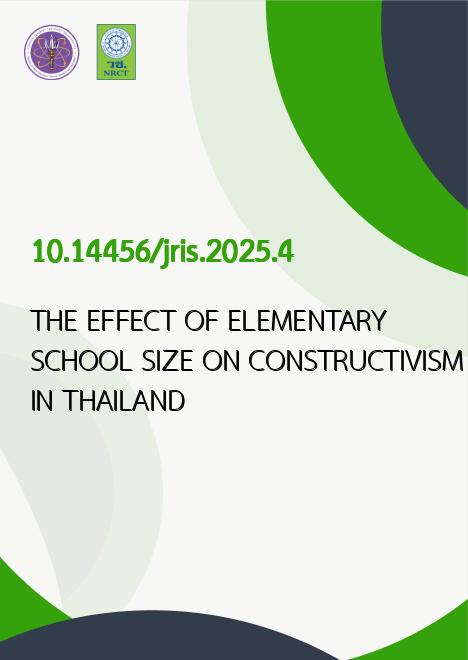
|
THE EFFECT OF ELEMENTARY SCHOOL SIZE ON CONSTRUCTIVISM IN THAILAND |
|---|---|
| รหัสดีโอไอ | |
| Creator | Pathompong Chummongkol |
| Title | THE EFFECT OF ELEMENTARY SCHOOL SIZE ON CONSTRUCTIVISM IN THAILAND |
| Contributor | Jiraporn Tupsai, Chokchai Yuenyong |
| Publisher | ห้างหุ้นส่วนจำกัด นวัตกรรมการเรียนรู้สร้างสรรค์ |
| Publication Year | 2568 |
| Journal Title | Journal of Research and Innovation for Sustainability (JRIS) |
| Journal Vol. | 2 |
| Journal No. | 1 |
| Page no. | 58-79 |
| Keyword | constructivism, science teaching, elementary school |
| URL Website | https://so17.tci-thaijo.org/index.php/JRIS |
| Website title | Journal of Research and Innovation for Sustainability |
| ISSN | 3056-9397 |
| Abstract | This study investigated the relationship between elementary school size in Thailand and the use of constructivist teaching methods. An explanatory sequential mixed-methods approach was employed, combining quantitative data from the Constructivist Learning Environment Survey (CLES) and qualitative data from teacher interviews. The research revealed that school size and student-teacher ratios significantly impact the learning environment. Larger and medium-sized schools with high national test score expectations demonstrated lower levels of constructivist learning. Conversely, smaller schools without such pressures exhibited higher levels of constructivist approaches. However, the study identified that teacher-student relationships and a supportive classroom atmosphere were crucial in promoting science education aligned with constructivist principles. Teachers who fostered camaraderie and encouraged open expression of opinions were more likely to facilitate active, collaborative learning experiences. The findings suggest that school size and national test performance expectations may influence teaching approaches and student learning experiences. In larger schools, teachers may adopt more traditional methods emphasizing memorization and rote learning, while smaller schools may have more flexibility to implement constructivist techniques. This research highlights the complex interplay of factors shaping the educational environment in Thai elementary schools. It underscores the need for further investigation to better understand these dynamics and inform effective teaching practices that balance constructivist principles with educational goals and constraints. |
